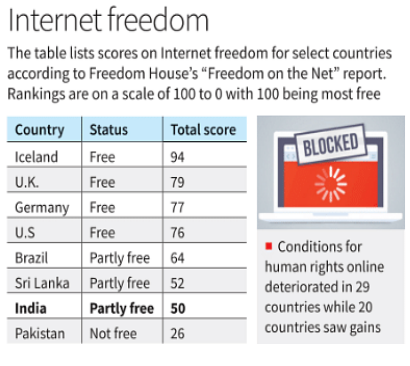Ahmedabad
(Head Office)Address : 506, 3rd EYE THREE (III), Opp. Induben Khakhrawala, Girish Cold Drink Cross Road, CG Road, Navrangpura, Ahmedabad, 380009.
Mobile : 8469231587 / 9586028957
Telephone : 079-40098991
E-mail: dics.upsc@gmail.com

News: India has consistently ranked highest worldwide in implementing internet bans for five consecutive years, representing over 60% of all reported blackouts between 2016 and 2022. While the government has justified these internet shutdowns over the past decade citing national security concerns and threats to public order, various rights groups have strongly criticized such actions.
Findings:
• Data collected by the Software Freedom Law Centre (SFLC) reveals that the Indian government enforced a total of 780 shutdowns between 2014 and 2023.
• The collected data highlights that India experienced internet shutdowns totaling over 7,000 hours in 2023 alone.
• Internet disruptions in India contributed to more than 70% of the global economic losses in 2020.
• Instances of shutdowns surged during significant events such as protests against the Citizenship Amendment Act in 2019, the abrogation of Article 370 in 2019, and the introduction of Farm Bills in 2020.
• Regionally, Jammu and Kashmir witnessed the highest number of shutdowns, totaling 433, in the last 12 years.
• The longest blackout in 2023 occurred in Manipur, lasting from May to December, amid ethnic clashes.
• As of February 15 of the current year, internet shutdowns remained active in Haryana amidst ongoing farmers protests..
Contrasting India’s Internet Shutdowns with Global Patterns:
• The latest Freedom House report indicates a 13-year consecutive decline in global internet freedom, with deteriorating online human rights environments noted in 29 countries.
• In contrast, India has experienced the majority of internet outages over the past decade localized to specific districts, cities, and villages.
• Globally, the primary reasons for internet shutdowns vary, with protests being the most common cause, followed by information control and political instability..
Legislative Framework:
• Indian Telegraph Act: Empowers states to impose shutdowns during public emergencies or for public safety, lacking precise definitions.
• Section 69A of the IT Act: Forms the basis for online content censorship, resulting in over 55,000 website blocks.
• Unlawful Activities (Prevention) Act: Used to block URLs linked to banned organizations, as exemplified in The Caravans case.
Consequences of Internet Shutdowns:
• Global Standards Compliance: Frequent shutdowns often do not align with the three-part test for legality, legitimacy, and proportionality as per international law.
• Economic Ramifications: Indias shutdowns were responsible for over 70% of the global economic losses incurred in 2020.
• Legal and Rights Issues: Despite Supreme Court rulings emphasizing violations of fundamental rights, there remains a lack of transparency in shutdown orders.
• International Standing: The prevalence of frequent shutdowns has contributed to Indias declining global internet freedom ranking, dropping from 59 points in 2016-2017 to 50 points in 2023.

Address : 506, 3rd EYE THREE (III), Opp. Induben Khakhrawala, Girish Cold Drink Cross Road, CG Road, Navrangpura, Ahmedabad, 380009.
Mobile : 8469231587 / 9586028957
Telephone : 079-40098991
E-mail: dics.upsc@gmail.com
Address: A-306, The Landmark, Urjanagar-1, Opp. Spicy Street, Kudasan – Por Road, Kudasan, Gandhinagar – 382421
Mobile : 9723832444 / 9723932444
E-mail: dics.gnagar@gmail.com
Address: 2nd Floor, 9 Shivali Society, L&T Circle, opp. Ratri Bazar, Karelibaugh, Vadodara, 390018
Mobile : 9725692037 / 9725692054
E-mail: dics.vadodara@gmail.com
Address: 403, Raj Victoria, Opp. Pal Walkway, Near Galaxy Circle, Pal, Surat-394510
Mobile : 8401031583 / 8401031587
E-mail: dics.surat@gmail.com
Address: 303,305 K 158 Complex Above Magson, Sindhubhavan Road Ahmedabad-380059
Mobile : 9974751177 / 8469231587
E-mail: dicssbr@gmail.com
Address: 57/17, 2nd Floor, Old Rajinder Nagar Market, Bada Bazaar Marg, Delhi-60
Mobile : 9104830862 / 9104830865
E-mail: dics.newdelhi@gmail.com